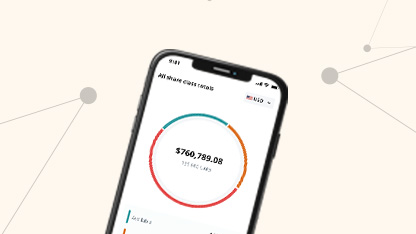The coronavirus pandemic is changing the economic landscape. Businesses worldwide are adjusting to the challenges in a variety of ways. More and more medium-sized listed companies are taking an innovative approach: they’re introducing employee participation programmes for the first time.
Jörg Ziegler, Managing Director Germany at Global Shares, and Steve Kavanagh, Head of Global Compliance at Global Shares, recently sat down with Going Public / Entrepreneur Edition to discuss this issue.
Why are share-based employee participation programmes popular among large German international companies, but not among listed German SMEs?
Jörg Ziegler:
It has to do with a lot of things. The main reason is the lack of equity culture in Germany in general and often also in the company itself. In addition, there are inadequate framework conditions in Germany. The tax incentives for employee participation programmes are incredibly low compared to other European countries and the issue of shares is not anchored in society. The result is the vast majority of medium-sized companies have never had such a programme and are therefore not sufficiently familiar with the subject. In my experience, they shy away from the implementation effort at home and, if necessary, abroad as well as the subsequent ongoing administration. This often turns the issue into a real black box for decision-makers in companies, which they prefer to keep their hands off when in doubt.
Doesn’t the issue of costs also play an important role for these companies?
Jörg Ziegler:
The effort or the costs are usually highly overestimated. So when companies implement share-based employee participation for the first time, they’re often happily surprised by the actual costs. Especially when they can get as many of the necessary services as possible (for the introduction and subsequent ongoing administration) from a single source.
German midcaps are very international today. What challenges does this bring with the introduction of employee participation programs and where specifically do companies need support?
Steve Kavanagh:
This already begins in the planning phase with the specific programme design. What do we, as a company, intend to do with the programme? Which type of programme suits the company best? Should we offer the shares at a discount? Do we grant the employees a subsidy or do we resort to a share matching programme in which the employee first purchases shares himself and then, after a waiting period, receives additional shares from the company in a predetermined ratio? Where do the stocks come from? What legal, tax and regulatory aspects do we have to consider if we want to introduce the program not only in Germany but also at our international locations. And, last but not least, how do we communicate the new program to our employees?
Sorry, but to newbies, that doesn’t sound easy, fast and inexpensive? In contrast to large corporations, aren’t medium-sized companies quickly overwhelmed by this because of their internal staff resource structure?
Jörg Ziegler:
We’re not talking about atomic physics here. You can make anything complicated – or you can choose a pragmatic and simple approach from the start. That’s the reason why share programs for employees are standard in the Anglo-Saxon world, while in Germany they are almost something exotic. The topic has always been part of the remuneration there – the way it is dealt with is completely different. I agree with you that compared to corporations, medium-sized companies have a completely different line-up and thus a different internal resource structure. Therefore, as a service provider, we consciously try to offer all the necessary services for companies from a single source where this is possible and legally permissible. This lowers entry barriers, saves time, internal and external coordination efforts and thus lowers costs in the long term.
How does that look? How do you approach the topic when a medium-sized company looks to lower these hurdles and how long does the introduction of such a program take on average?
Steve Kavanagh:
We usually start with a workshop to discuss the necessary program parameters with the company and develop the right program. We clarify which legal, tax and regulatory things have to be considered during a roll-out, both in Germany and internationally. In our function as a regulated financial service provider, we also support the introduction, subsequent ongoing administration and custody of the shares with a web-based online administration platform developed by us. We introduced such programs to our medium-sized customers in just over 8 weeks. As a rule, the introduction to the roll-out (including all preparatory work)d takes 3 months. In turn, compared to large companies, medium-sized companies benefit from their very short decision-making paths and enormously shorten the implementation time.
Is the corona pandemic holding back the introduction of employee participation programs in medium-sized companies? Don’t companies have completely different priorities?
Jörg Ziegler:
It’s actually the opposite. Corona acts as an accelerator, not just for technology. This year, many listed companies have put a great deal of thought into using the tax-free and social security-free “Corona Bonus” of € 1,500.00 for their existing or new employee participation programs. The general increase in the current tax exemption from €360.00 to €720.00 per year and employee from 2021 onwards does the rest. All of this creates more awareness in the company for the topic and its importance in the company’s success.
This publication contains general information only and J.P. Morgan Workplace Solutions is not, through this article, issuing any advice, be it legal, financial, tax-related, business-related, professional or other. J.P. Morgan Workplace Solutions’ Insights is not a substitute for professional advice and should not be used as such. J.P. Morgan Workplace Solutions does not assume any liability for reliance on the information provided herein.



